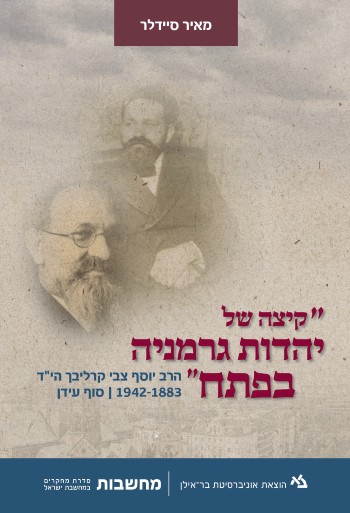
Rabbi Joseph Tzvi Carlebach (1883-1942) was one of the most important Orthodox rabbis in Germany in the last generation before the Holocaust and served in his last days as the chief rabbi of Hamburg. After Kristallnacht he was actually the last Orthodox rabbi to serve in Nazi Germany, until he was deported to the "East" and murdered. His personality and image stood out in his public practice, in his thought, as well as in his dealings as a rabbi and as a public leader in the most terrible period in the history of the Jewish people.
The figure of Rabbi Carlebach largely represents the last generation of Orthodox Judaism in Germany, in particular the rabbinic intellectual layer that grew up there. This generation of rabbis acted at the end of a process that lasted more than a hundred and fifty years - since the days of Moses Mendelssohn (1729-1786) and Rabbi Samson Hirsch (1800-1888) - and developed an approach that bridges the gap between European culture and the learned and popular Judaism of neighboring Eastern Europe. Carlebach was a partner in this bridging cultural enterprise - in his practice, in his thinking and in leading his flock. This book - which is largely of a comparative nature - is another layer in the study of the intellectual history of German Jewry in recent generations, with special emphasis, of course, on the period of Nazi rule.
The way Rabbi Carlebach dealt with the events of his time expresses not only his complex and unique personality, but also sheds light on the deep intellectual and emotional involvement of most of the German rabbis in the culture that gave birth to the monster that eventually destroyed their communities. Therefore, Rabbi Carlebach's story in its various aspects - in particular the intellectual aspect - is a case study that describes an entire period and the personalities who were active in it.
Dr. Meir Seidler is a senior lecturer in Jewish philosophy at Ariel University and teaches at the School of Jewish Studies at Bar-Ilan University. His distinct area of expertise is Modern Orthodox Judaism, in particular German Judaism.
Danacode: 110-20336 ISBN: 978-965-226-636-1 Language: Hebrew Pages: 224 Weight: 500 gr Dimensions: 17X24 cm Publication Date: 12/2022 Publisher: Bar-Ilan University Press
CONTENTS
Preface by Yaakov Kohler 7
Foreword 11
Chapter 1: Rabbi Joseph Tzvi Carlebach and his Epoch 15
1. German Jewry in the Modern Era – A Short Sketch of the Historical and Cultural Background 15
a. The Unique Character of German Jewry 15
b. What is Orthodox Judaism 16
c. The Cultural and Communal Impact of Rabbi Samson Raphael Hirsch 18
2. Rabbi Joseph Tzvi Carlebach 21
a. Life 21
b. Rabbinic Profile 28
c. Carlebach’s Stance towards Reform Judaism 31
d. Carlebach’s Writings 35
e. His Personality 37
Chapter 2: Carlebach’s Intellectual Profile 41
1. Religion and Science – His Stance towards Bible Criticism 42
a. Tanach 44
b. Bible Criticism as Judaism’s Enemy 47
c. A Critique of the Presuppositions of Bible Criticism and its Method 51
d. Critical Appraisal 59
2. Religion and Science – The Challenge of Natural Sciences 60
a. Creation 60
b. Miracles 63
3. Liberty 68
4. The Architecture of the Synagogue 72
a. The Prospect of the Berlin Rabbinate 73
b. The Article “The Architecture of the Synagogue” 75
Chapter 3: His Attitude towards Eretz Israel and Zionism 82
1. His Sojourn as a Young Man in Eretz Israel as a Formative Experience 82
2. Carlebach’s Connection to Eretz Israel and Zionism during WWI and its Aftermath 86
3. Theological Considerations in Carlebach’s Assessment toward Zionism 90
4. In the Labyrinth of Jewish-Orthodox Politics 95
5. Confronting the “Frankfurt Principle” 97
a. Background 97
b. Carlebach and Breuer 100


